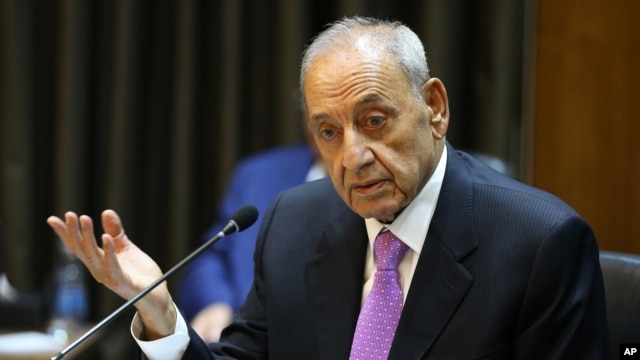
The Lebanese parliament failed
again — on its 40th try — to choose a new president after only 39
members showed up for the electoral session Thursday, which was
boycotted by parliament speaker Nabih Berri and most MPs from
Hezbollah’s political bloc. The country has been without a president
since May 2014.
The deputy speaker of parliament convened the electoral session in
the absence of Berri and announced that legislators will meet June 23 to
try again to elect a new president.
Former prime minister Fouad Saniora told journalists after the failed
Thursday session that he thought it was the pro-Iranian Hezbollah group
that was preventing an election from taking place. According to Saniora, Hezbollah says it is supporting General Michel
Aoun for president but is, in fact, using the election as a bargaining
chip with respect to sanctions on the group and the debate over its role
in the region.
Former president Michel Suleiman’s term ended May 24, 2014, after
Hezbollah and its allies refused to extend his term and clashed with the
rival pro-Western March 14 coalition over the choice of a successor.
Aoun, whom Hezbollah says it supports for the post, told journalists a
few days ago that recent municipal elections give a better picture of
the balance of forces in the country than does parliament.
A heavy turnout in the Christian regions north of Beirut offer a
clearer idea of the actual balance of forces in the country, Aoun says,
since these areas are not well represented on the national level.
Prime Minister Tammam Salam, who is the acting head of state in the
absence of a president, expressed frustration over the political impasse
at a gathering of the country’s industrial leaders.
Analyst Nadim Shehadi, who heads the Fares Center at Tufts
University’s Fletcher School of Law and Diplomacy, tells VOA that
Lebanon’s political system is built to go into paralysis when political
rivals are unable to reach a consensus.
“The system is paralyzed and it was built in such a way that if a
consensus can’t be reached it goes into paralysis, and we are in a
situation where we either have to capitulate to Hezbollah and its
demands or go into paralysis,” Shehadi said.
Shehadi points out, however, that the recent municipal elections
painted a rosier picture of Lebanon’s political health, given the active
participation of most communities, political parties and various NGOs.



